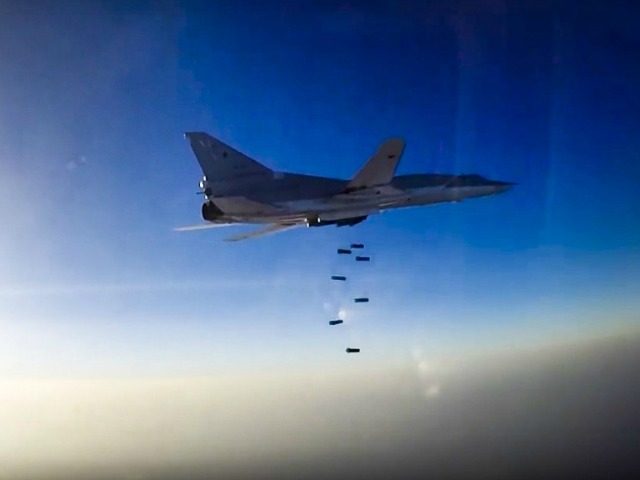Lt. General Stephen Townsend, the top American commander for anti-ISIS operations in Syria and Iraq, said on Wednesday that Russian and Syrian planes bombed villages held by U.S.-backed forces.
As CNN summarizes his remarks, Townsend said the Russian and Syrian pilots thought they were hitting villages held by the Islamic State, but in truth, Syrian-Arab troops fighting for the U.S.-led coalition had taken over. The bombing runs were witnessed by U.S. military advisers and were halted when the U.S. notified Russia of the error through “deconfliction channels.” In fact, The Week reports American troops were only three miles away when their Syrian allies were hit.
The Russian Defense Ministry denied the U.S. account and said neither Russian nor Syrian planes had conducted airstrikes near the sensitive town of Manbij in the Aleppo province. According to the Russians, an American officer contacted a representative of the Russian air group at Khmeimim Air Base with concerns about the possible accidental bombing of U.S.-allied forces in the area, and the Russians duly avoided striking the indicated coordinates.
The New York Times quotes Gen. Townsend explaining how crowded and confused some of the Syrian battlefields are:
The battlefield in northern Syria is crowded with a diverse array of forces near Al Bab, including Turkish-backed Syrian militias, Syrian government forces, Kurdish and Arab fighters backed by the United States, and ISIS militants.
“Around Al Bab, all the forces that are acting in Syria have converged literally within hand-grenade range of one another,” General Townsend said.
There has been a similar convergence of forces to the east where Syrian government forces have advanced to the point where they are within “rifle range” of Syrian Arab fighters backed by the United States who are defending the area around Manbij, the general added.
“It’s very difficult and complicated,” he said.
Reuters provides an interesting example of how the U.S. coalition is attempting to sort the battlefield out, as a U.S.-backed militia announces it will return some villages under its control to the Syrian regime:
The villages will be surrendered to the Syrian government in the coming days, an official in the Manbij Military Council told Reuters. An earlier statement by the council said the villages would be handed to Syrian border guards.
Turkey’s Foreign Minister Mevlut Cavusoglu told reporters in Ankara the report was false, but added there was an agreement with Russia that Syrian government and opposition forces should not fight each other in that area.
The villages west of the city of Manbij have been a focus of fighting between the Turkish-backed rebels and the Manbij Military Council, the U.S.-allied militia, since Wednesday.
Turkish President Tayyip Erdogan said this week Manbij was the next target of Ankara’s campaign in northern Syria following the capture of nearby al-Bab from Islamic State last week.
“We will move towards Manbij after the al-Bab operation is completed, but the operation has not started yet. We know that the U.S. special forces are in that region, and we want the YPG to leave Manbij as soon as possible,” Cavusoglu said.
The Manbij Military Council is part of the Kurdish-led Syrian Democratic Forces (SDF) group. Observers have been wondering if the Turks and their allies might be on the verge of full-blown war against Kurdish groups.
In fact, al-Monitor speculates the Turks will have to fight their way through the Kurds if they want to reach the ISIS capital of Raqqa first. They might want to provoke a confrontation with the Kurds to keep them from digging in on the outskirts of Raqqa or at least intimidate them into pulling back.
Turkey is supposed to be in Syria to help battle ISIS, but the main reason they might be eager to reach Raqqa is that they do not want the Kurds to play a significant role in the liberation operation. As Reuters reports, Cavusoglu explicitly said he wanted the United States to stop cooperating with Kurdish groups.
ARA News quotes some volunteers who fought with the Kurdish YPG in the area and are furious about Turkey’s actions:
Joe Akerman, a former British volunteer with the YPG [SDF’s leading Kurdish faction], in an interview with ARA News called on the US-led coalition to intervene and stop the attacks.
“How can Turkey justify attacking the YPG [People’s Protection Units] and the SDF. And how can the coalition forces allow this to happen? Turkey should get out of Syria, they are causing more trouble than ever,” Ackerman said. “Turkey previously supplied Daesh [ISIS] and now they just give them uniforms and use the whole fight against Daesh as a cover to kill SDF and YPG fighters.”
“The attacks on the SDF in Manbij are an affront to democracy. While the multi-cultural SDF are on the verge of entering Raqqa, the Turkish-backed FSA are desperate to start a new war in the North,” said Macer Gifford, a former volunteer with the YPG who fought in Manbij.
“Turkey has shown the world that their intervention in Syria is only down to a desire to destroy the Kurdish democracy movement and not to defeat the jihadists,” Gifford told ARA News.
“On the contrary, this unilateral action from Turkey will only grant a life line to the so-called Islamic State, which is incurring heavy losses in both Iraq and Syria. If the American-backed coalition is serious about defeating ISIS and unifying Syria, then we must see universal condemnation,” he added.
Gifford warned that a full assault by Turkish-backed forces on Manbij would prompt the SDF to divert “significant resources” to defend the city, delaying or derailing the planned Raqqa offensive.

COMMENTS
Please let us know if you're having issues with commenting.